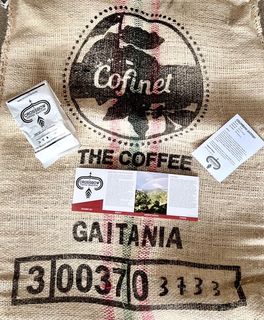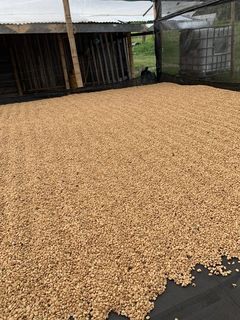December 2021
Feature #38
Lets give a warm welcome to Crossbow Coffee Roasters. A much anticipatred collaboration. We first spoke to Crossbow Coffee Roasters way back when we first started, but with us both having a lot going on including Crossbow having a name change and re brand, things were left to slide with the knowledge it would haoppen when the time was right.
That time was December 2021.What a way to round out a year of ups and downs, highs and lows and questioning everything we thought we knew. Crossbow Coffee Roasters reached out to us with two coffees, we couldn't beleive our luck with what we saw. A coffee story we have been chasing for a couple of years.
Lets explore December:
NASA WESX (THE PRODUCERS)
This coffee, a regional lot is produced by the Nasa Wesx community of Gaitania with the assistance of ASOPEP, a Planadas based cooperative who have worked with the Nasa Wesx community since 2014 and enabled them to certify their coffee organic.
Nasa Wesx are indigenous communities of Colombia, Living in remote areas of Tolima, Huila and Cauca departments. Consisting of Paez and Nasa tribes, the indigenous people were brought to Planadas (Southern Tolima) over 100 years ago to work in the gold mines by the Colombian Army. Since gaining independence, the Nasa Wesx people have remained in the area and cultivated organic coffee in line with their tribes ancient values, values and practices which see native flora untouched by farming practices.
Steadfast in their occupation of their lands, the group are known for reclaiming their land through repossession as well as through official channels. Vocal in demanding their rights and opposing the clearing of ancestral lands for monoculture farming, the non violent indigenous community has sadly been met with violent resistance, from targeted killings, to massacres on their land reserves.
In recent years a number of activists have been killed, not just by militants, but also at the hands of police.
In the face of armed confrontation, the non violent resistance calls on community members of all ages to swarm around the armed groups and remove their weapons.
GAITANIA (MUNICIPALITY)
Located in the south of Tolima is Gaitania. Situated in the foot hills of Colombia’s tallest volcano, Nevado del Huila, the local landscape if blessed with fertile soil and favourable climate for agriculture, the backbone of its economy.
The region is made up of mostly small lot holders with an average farm size of 4 hectares of which about 75% of the farm is typically planted in coffee, with the remaining land used for livestock, cultivation of fruit, vegetables and cereals. While Giatania has a long history of producing high quality coffee, it is also recognised for producing something else, the FARC insurgent movement (now more widely known as Revolutionary armed forces of Colombia). Formed in 1964 with a membership of 48 fighters, by the year 2000, membership had grown to 18,000 and the group had come to be regarded as a terrorist organisation (with links to the IRA, Taliban and others), responsible for environmental attacks such as the 2015 bombing of an oil pipeline that left 15,000 people without access to water. While FARC transitioned to become a political party in 2016, the result of a ceasefire agreement between the group and he Colombian government, former members who didn’t accept the peace deal have continued with endeavours such as kidnapping for ransom and remain involved in the illicit drug trade.
TOLIMA (Department)
Located in the centre west of Colombia lies Tolima Department, one of 32 department within the country.
Prior to Spanish colonisation in the mid to late 1530’s, was home to the Piajo ethnic group and it is from their language which the department takes it name, meaning “snowed.’
Its relative proximity to the equator means it doesn’t experience seasons, more so a variety of mountainous temperatures. The backbone of the local economy is agriculture, with Tolima being the number one producer of Rice and sesame in Colombia, while being known for its coffee production.
Culturally, in pre-Spanish colonisation, Tolima was known for its pottery and goldsmithing but in its present day,
its the cuisine and its musical expression that sets it apart, with the departments capital Ibaque dubbed the music capital of Colombia.
The shadow of pre Spanish goldsmithing still hangs over Tolima, with gold deposits in the Andes being one of the 10 largest in the world. Had it not been for a dedicated group of people (many indigenous) who put their lives on the line (sadly in some cases losing their lives) to protect the local environment, from what was planned to become the second largest opencast gold mine in the world, covering 515 hectares.
The location and environmental practices of gold mining would have threatened the water quality of the Coello river, a water source to 60% (1.2 million) Tolimian residents, as well as threatening hundreds of species of birds, 70 amphibian species and an adjacent forest reserve.
TASTING NOTES
Country:Colombia
Region:Tolima
Varietal:Castillo, Caturra
Process:Washed
Altitude:1700-1900 m.a.s.l
Tasting notes:Peach Iced Tea, Citrus.
Photos courtesy of Cofinet.
|
© Copyright Derelict Coffee Roasters |



